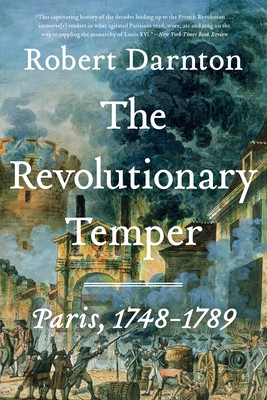
- We will send in 10–14 business days.
- Author: Robert Darnton
- Publisher: W. W. Norton & Company
- ISBN-10: 1324086424
- ISBN-13: 9781324086420
- Format: 14 x 20.8 x 2.6 cm, minkšti viršeliai
- Language: English
- SAVE -10% with code: EXTRA
Reviews
Description
When a Parisian crowd stormed the Bastille in July 1789, it triggered an event of global consequence: the overthrow of the monarchy and the birth of a new society. Most historians account for the French Revolution by viewing it in retrospect as the outcome of underlying conditions such as a faltering economy, social tensions, or the influence of Enlightenment thought. But what did Parisians themselves think they were doing--how did they understand their world? What were the motivations and aspirations that guided their actions? In this dazzling history, Robert Darnton addresses these questions by drawing on decades of close study to conjure a past as vivid as today's news. He explores eighteenth-century Paris as an information society much like our own, its news circuits centered in cafés, on park benches, and under the Palais-Royal's Tree of Cracow. Through pamphlets, gossip, underground newsletters, and public performances, the events of some forty years--from disastrous treaties, official corruption, and royal debauchery to thrilling hot-air balloon ascents and new understandings of the nation--all entered the churning collective consciousness of ordinary Parisians. As public trust in royal authority eroded and new horizons opened for them, Parisians prepared themselves for revolution.
Darnton's authority and sure judgment enable readers to confidently navigate the passions and complexities of controversies over court politics, Church doctrine, and the economy. And his compact, luminous prose creates an immersive reading experience. Here is a riveting narrative that succeeds in making the past a living presence.
EXTRA 10 % discount with code: EXTRA
The promotion ends in 23d.13:48:34
The discount code is valid when purchasing from 10 €. Discounts do not stack.
- Author: Robert Darnton
- Publisher: W. W. Norton & Company
- ISBN-10: 1324086424
- ISBN-13: 9781324086420
- Format: 14 x 20.8 x 2.6 cm, minkšti viršeliai
- Language: English English
When a Parisian crowd stormed the Bastille in July 1789, it triggered an event of global consequence: the overthrow of the monarchy and the birth of a new society. Most historians account for the French Revolution by viewing it in retrospect as the outcome of underlying conditions such as a faltering economy, social tensions, or the influence of Enlightenment thought. But what did Parisians themselves think they were doing--how did they understand their world? What were the motivations and aspirations that guided their actions? In this dazzling history, Robert Darnton addresses these questions by drawing on decades of close study to conjure a past as vivid as today's news. He explores eighteenth-century Paris as an information society much like our own, its news circuits centered in cafés, on park benches, and under the Palais-Royal's Tree of Cracow. Through pamphlets, gossip, underground newsletters, and public performances, the events of some forty years--from disastrous treaties, official corruption, and royal debauchery to thrilling hot-air balloon ascents and new understandings of the nation--all entered the churning collective consciousness of ordinary Parisians. As public trust in royal authority eroded and new horizons opened for them, Parisians prepared themselves for revolution.
Darnton's authority and sure judgment enable readers to confidently navigate the passions and complexities of controversies over court politics, Church doctrine, and the economy. And his compact, luminous prose creates an immersive reading experience. Here is a riveting narrative that succeeds in making the past a living presence.


Reviews